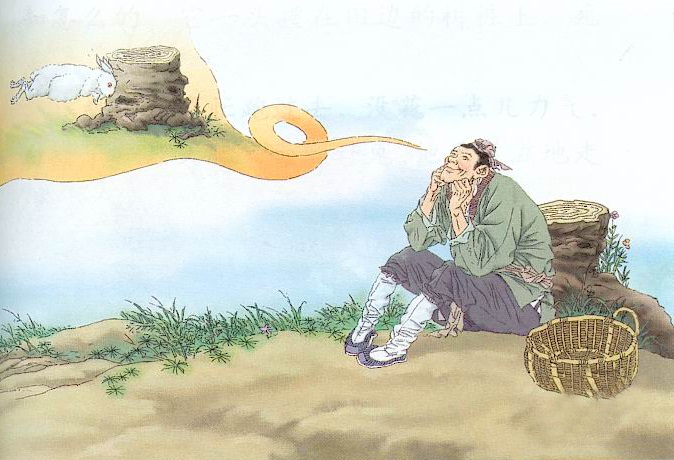守 shǒu 株 zhū 待 dài 兔 tù
English Translation
lit.: To keep watch by a tree stump, waiting for rabbits
fig.: Trusting luck, waiting for a windfall, to wait idly for opportunities.
Breaking it down
- 守: guard, keep watch
- 株: tree stump
- 待: wait
- 兔: rabbit

Source: Google Image Search
Story in Chinese
相传在战国时代宋国,有一个农民,日出而作,日入而息.遇到好年景,也不过刚刚吃饱穿暖;一遇灾荒,可就要忍饥挨饿了. 他想改善生活,但他太懒,胆子又特小,干什么都是又懒又怕,总想碰到送上门来的意外之财。奇迹终于发生了。深秋的一天,他正在田里耕地,周围有人在打猎。吆喝之声四处起伏,受惊的小野兽没命的奔跑。 突然,有一只兔子,不偏不倚,一头撞死在他田边的树根上。当天,他美美地饱餐了一顿。从此,他便不再种地。一天到晚,守着那神奇的树根,等着奇迹的出现。成语“守株待兔”,比喻亡想不劳而得,或死守狭隘的经验,不知变通。
Source: baike.baidu.com
Story in English
There once was a farmer in the Song Dynasty during the Warring States period. He worked when the sun rises and stopped when the sun set. In a good year, he will have just about enough food and clothing, but in a bad year, he will be hungry.
He wants to improve his life, but is too lazy and not brave enough, always afraid to do anything, always hoping for a lucky windfall.
Then, a miracle finally happened. On a day in late August, he was plowing the fields, whilst others were around him, hunting.
Suddenly a rabbit came, and hit a tree stump next to the field, and died. That day, the farmer had a nice meal. Since then, he stopped farming.
From morning to evening, he waited at that magical tree stump for another miracle to appear.
Thus the idiom "To keep watch by a tree stump, waiting for rabbits" is an expression for someone who relies on single experiences, waiting idly for opportunities to magically appear.
Translation by Celine Li
Usage
做有些事不能只知道守株待兔,要主动抓住时机!